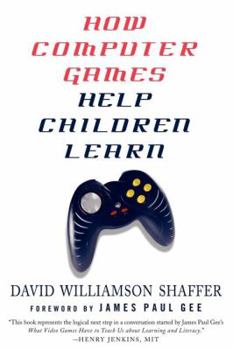How Computer Games Help Children Learn
Select Format
Select Condition 
Book Overview
How can we make sure that our children are learning to be creative thinkers in a world of global competition - and what does that mean for the future of education in the digital age? David Williamson Shaffer offers a fresh and powerful perspective on computer games and learning. How Computer Games Help Children Learn shows how video and computer games can help teach children to build successful futures - but only if we think in new ways about education...
Format:Paperback
Language:English
ISBN:0230602525
ISBN13:9780230602526
Release Date:February 2007
Publisher:Palgrave MacMillan
Length:242 Pages
Weight:0.95 lbs.
Dimensions:0.7" x 6.0" x 9.0"
Customer Reviews
3 ratings
A Fascinating Concept of Games; needs more research
Published by Thriftbooks.com User , 17 years ago
David Shaffer proposes here that we educate children by having them do the things adults do--only by simulating them in game form. This is an idea I haven't run across before, and I think it may have real merit. I have a nine-year-old son who attends public school. His school spends a lot of money and effort on computer learning, but I have been frankly underwhelmed by the results. The educational software I've seen doesn't strike me as much of an advance over flash cards--just a lot more expensive. I consider myself generally a skeptic on the whole subject of computers in the classroom. Shaffer's point is that not just any learning software will have educational benefits. The software must be a serious attempt to simulate the sort of tasks that adults do, such as running a business or designing a building. Shaffer calls these epistemic games. Shaffer's descriptions of some of these games do sound interesting, and he provides some evidence that children learn a lot from them. Shaffer's research seems to have dealt mainly with teenagers; his evidence for the benefits of these games seems much less solid for younger children. I can't say that I'm convinced that computers in the classroom are worth the costs, but after reading Shaffer's book I'm willing to at least consider the idea. Shaffer may indeed have something here that could be a significant step forward in education. That said, Shaffer's research strikes me as very preliminary. His studies involved only a few kids, who were far from randomly selected. The teachers were hand-picked, highly motivated, and interested in the subject they were teaching. The ratio of teachers to students was high, and the teachers put in a lot of effort. The kids were followed up for only a short time. This is a long way from being proof that the epistemic game concept works. In my opinion, it's very unlikely that conditions this favorable for learning could be maintained for large numbers of children for a long period at reasonable cost. Teachers putting in that kind of effort burn out quickly. Would epistemic games work with ordinary kids being taught by an ordinary teacher? Who knows? If this sounds like I'm being a bit of a sourpuss, the fact is that the history of education is absolutely replete with "reforms" that worked well with a few kids and a select group of teachers, but failed to improve education in the long term. American schools today are in very sad shape. Much of the blame for that goes to well-meaning educational reforms that were implemented too hastily, without evidence that they really improved educational outcomes for most children. Overall, though, Shaffer's book is interesting and well worth reading.
innovative play
Published by Thriftbooks.com User , 17 years ago
In this book, Shaffer takes the conversation about games and their relevance to society in general, and for children's learning in particular, to a new level. In a world where standardized thinking is rapidly being encapsulated in machines or outsourced, he says, education ought to be about providing young people with opportunities to learn innovative ways of thinking. Which is where computer games come in: these games "are significant because they let us think in new ways" (p.191). While touring a variety of video and other games, the book is centrally concerned with a new kind of game called an "epistemic game." In these games, players physically take on professional roles, like that of an engineer or architect, and use computers (and mentors/peers) to identify and solve problems - to think - like professionals. In each of its six chapters, the book explores a specific epistemic game, such as Digital Zoo (about engineering), through a particular professional dimension, such as the specific "Knowlege" or "Values" of an engineer. (Promising commercial games are discussed along similar lines at the end of each chapter as well.) As a result, the book moves easily back and forth between personal stories and impressive studies, helping readers connect solid research on game playing with important learning theories. This book is a must read for anyone interested in games, learning, and compelling visions for how to transform education.
A better way to teach today's kids... and then some.
Published by Thriftbooks.com User , 17 years ago
Dr. Shaffer aims high and really hits the mark. Most recent, successful books about learning and video games go for the seasoned computer aficionado (me), or the rank computer newbie (my husband). Rarely do they target both. Shaffer's topics are deep and wide, but his language is fluid and unassuming; as a result, both audiences will find useful chunks of knowledge that resonate. It is not hard to understand why todays twelve-year-olds would rather play SIMS or DOOM than finish their math homework. Shaffer (and his excellent team of graduate students) makes a very compelling case for why those experiences need not be mutually exclusive. In fact, if the games in the book become more the standard in U.S. schools, there might indeed be hope for our kids in the world-wide digital market after all.






